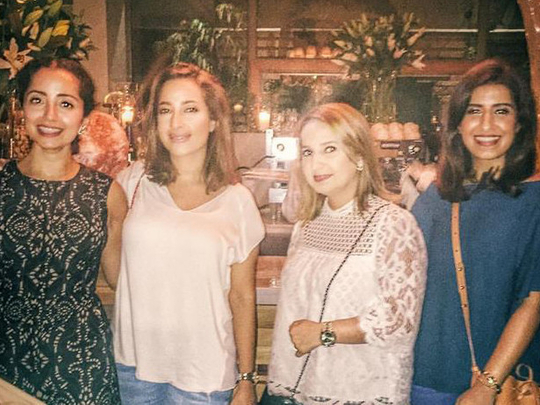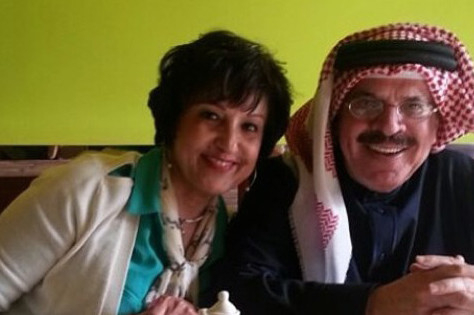
Manama: Luma Bashmi has gained a reputation since her early years for being fearless and brave in confronting challenges. She often gave the impression that she thrived on tackling difficult situations that made the best of her mental capabilities and her stamina stand out in the open.
Name a recent major challenge the Bahraini young woman had to face? Breast cancer!
Her first reaction? Go public and fight. It is not a shame that I have to suffer. It is not some crime I committed. It is a challenge and I take head on, she said.
“I was diagnosed at 31 years old around six months ago today,” she said on her Facebook account. Simple facts. No drama. Her lifestyle.
“I’m lucky, it was early stage I had health insurance, the best doctors, was in the best city to get treated and recover. My mom, grandma, and aunt had it, yet I was BRCA1 and BRCA2 negative. I did the surgery, replaced both, reducing my risk of local recurrence. Most importantly, I had peace of mind to find information and use knowledge as ammunition to get the best treatment path for me.
I didn’t need chemo, only radiation, which I start in five days.”
Luma, the daughter of Ebrahim Bashmi, a well-known Bahraini author, columnist and politician, shared the physical and mental changes within her.
“I no longer am fully able to do a downward dog or hold a headstand for more than five seconds after removing two lymph nodes in my right arm. Sounds like a ridiculous thing to care about at this point. But I’m able to do so much more now. I am so much more.
I’m a different person now, stronger, at peace, letting go of the smaller things + societal expectations of how to live my life. I try to love what I do each day, relearning how to “live” again.”
What makes Luma happy?
“Simple things. Family, friends, social support, dogs, being outdoors. It took two months to go back to swimming, three to do spinning and gym, and four for my ultimate escape, running. And for that, I’m happy.
I’ve spoken to survivors who have become friends and young friends who are fighters.
Some have chosen to keep their journeys private and I honour them for it. They make me believe in a more fulfilling life.”
Why did she choose to go public?
“I thought a lot about sharing my journey publicly, thinking, ‘Will I be helping someone else in theirs? Will I feel too vulnerable sharing this emotional roller coaster of forever waiting for test results? Will I forever be seen as the poor weak cancer patient and not Luma? Or will I just bask in the attention (online and offline) of friends, acquaintances and strangers?’ At the end, none of that mattered. Good friends and family came through more than I could have hoped for or imagined.
I believe in the good in people and the world. So much kindness, help, and love continue to come my way.”
At the end of the treatment, she shared her emotions, posting her latest picture.
“This is the face of someone who just finished their last day of radiation!! So lucky to be alive, so happy and blessed to breathe and eat and see my family and friends and work and cook and run and live and … I can’t begin to describe how amazing it feels,” she said.
“On my walk home tonight I just admired the beauty of stranger’s faces, the smells of delicious food coming from random restaurants I passed by, the feeling of the crisp cold wind on my face, the sound of my feet hitting the pavement, and the fact that I can go home, make a home cooked meal and watch Netflix . So happy and grateful to be alive! And I hope I never forget this feeling.”
Her friends, the crouton bits in the salad bowl of life, as she calls them, were enthusiastic about her recovery, admiring her courage in the face of serious challenges and her courage to come out so genuinely in the open.
“This was really inspirational. I keep reading it I can’t get enough,” Noora Al Mutawa said.
“Thank you. Thank you for sharing it all and spreading light and encouragement. May all your days be filled with joy!”
But while Luma enjoyed tremendous support from family and friends, other women were not so lucky.
Sarah Mohammad, a Saudi, had a first shock when she was diagnosed with breast cancer. She immediately set to fight it and to make her will to live healthily and happily prevail.
Her family and some friends offered full support, pledging to assist in every way they could. But not her husband. That was her second major shock in a matter of days.
“He was the first one to distance himself from me,” Sarah told Rotana Khaleejia on the phone. “He told me to stay at home with our children, while he launched a search to look for another wife.”
Sarah attributed his peculiar behaviour to a phobia from diseases
“Once I started the treatment he developed an illness phobia and left me, but there was no divorce for the sake of our children. It was very painful an I had to draw on my deep faith in God, the love of my family and support from the medical staff to resist and fight back until I overcame the disease,” she said.













